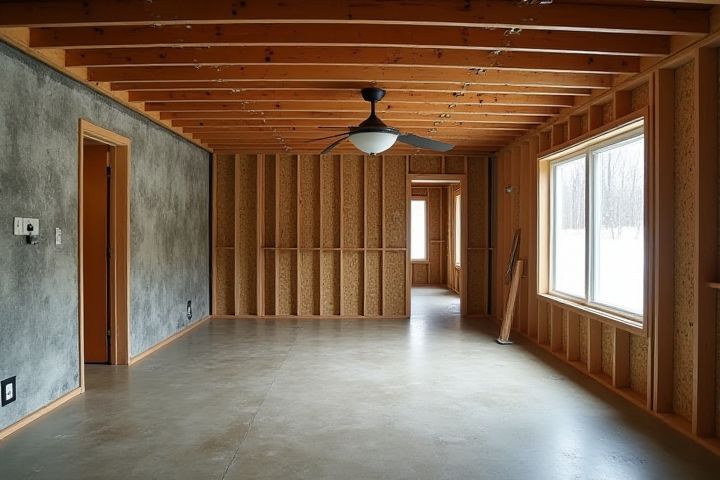
Selecting a house with a basement often depends on your specific needs and lifestyle preferences. A finished basement can provide additional living space, making it ideal for a home office, gym, or guest room. If you live in an area prone to extreme weather, a basement can also serve as a safe haven during storms or natural disasters. Keep in mind that basements may require extra maintenance, such as moisture control and ventilation systems, to prevent issues like mold and water damage. Evaluating the layout and accessibility of the basement is crucial to ensure it meets your functional requirements.
When To Choose A House With A Basement
Flooding risk
When considering a house with a basement, it's crucial to assess the flooding risk associated with the location. Homes in flood-prone areas or regions with heavy rainfall may face significant water intrusion, compromising the structural integrity of the basement. Implementing proper drainage systems and ensuring sufficient waterproofing can mitigate risks, but it's essential to evaluate local historical flooding patterns and possible climate change impacts. Your decision should also include consulting with experts to determine if the basement layout and materials used are suitable for the anticipated moisture levels.
Additional living space
Choosing a house with a basement can significantly enhance your living experience by providing valuable additional living space. Basements can serve multiple purposes, such as a recreation room, home gym, office, or guest suite, thereby increasing the functionality of your home. They also offer potential for future renovations, such as converting the space into an apartment to generate rental income, which can boost your investment. Whenever you seek versatile areas to accommodate changing lifestyles or family dynamics, a basement is a worthwhile consideration that adds inherent value to your property.
High water table
Choosing a house with a basement in an area with a high water table requires careful consideration. Homes built in such regions may experience moisture issues, where the water table can rise during heavy rainfall, potentially leading to flooding. It's crucial to assess waterproofing measures and drainage systems integrated into the basement design to mitigate these risks. If you decide on a basement home, ensure that proper inspections are conducted to address any existing water-related concerns and to guarantee a healthy living environment.
Resale value
Choosing a house with a basement can significantly enhance your resale value, especially in regions where basements are desirable. Properties featuring a finished basement typically sell for **10% to 20%** more than those without, according to real estate studies. A well-designed basement can add valuable living space, increasing your home's square footage by **roughly 500 to 1,000 square feet** on average. Moreover, potential buyers often seek versatile spaces for home offices or entertainment, making basements an appealing selling point.
Maintenance cost
Choosing a house with a basement can significantly impact your long-term maintenance costs. Basements are prone to moisture issues, which may require additional investments in waterproofing and regular inspections to prevent mold growth. The presence of plumbing and electrical systems in a basement can also lead to increased upkeep if not properly maintained. Consider your local climate and soil conditions, as these factors can greatly influence the durability and care required for a basement space.
Storage needs
Choosing a house with a basement can significantly enhance your storage capacity, offering ample space for seasonal items, holiday decorations, and rarely-used belongings. A well-optimized basement can serve multiple purposes, such as a workshop, home gym, or even a play area, thereby increasing the versatility of your living space. Ensure your basement meets your storage needs by checking for moisture issues and adequate access points, which are crucial for maintaining the condition of stored items. By evaluating your personal storage requirements, you can make an informed decision that maximizes your home's functionality.
Heating efficiency
A house with a basement can significantly enhance heating efficiency, especially in colder climates. Basements provide a natural insulation layer, maintaining a stable temperature and reducing heating costs by 10-20%. When selecting a home, consider basements equipped with proper insulation and energy-efficient heating systems, as these features can improve your overall comfort and lower energy bills. Look for homes with proper ventilation and moisture control, which can further enhance the efficiency of your heating system.
Local building codes
Choosing a house with a basement requires careful consideration of local building codes, which dictate construction standards, safety regulations, and proper drainage systems. These codes can vary significantly by region, impacting everything from ceiling height minimums to egress requirements for windows as well as ventilation standards to prevent moisture buildup. Understanding these regulations ensures that the basement can be safely utilized for living space, storage, or recreational purposes while complying with health and safety guidelines. It's essential to consult with local authorities or a knowledgeable real estate agent to ensure the basement meets your needs and adheres to all legal stipulations.
Natural light availability
When selecting a house with a basement, consider the availability of natural light as a crucial factor. A well-designed basement should feature windows that allow sunlight to filter in, enhancing both the ambiance and mood of the space. Look for properties with egress windows, which not only provide safety but also improve ventilation and make the basement feel less confined. Maximizing natural light can transform the basement into a functional area, making it suitable for hobbies, a home office, or entertainment.
Sound insulation
When choosing a house with a basement, consider that a finished basement can provide substantial sound insulation, effectively reducing noise from the foundation and outdoors. This added layer can cut sound transmission by up to 15 decibels, creating a quieter living environment. Your lifestyle and the activities you enjoy, such as playing music or hosting gatherings, will benefit significantly from this soundproofing advantage. Look for features like insulated walls and ceilings in the basement to maximize your home's acoustic performance.
